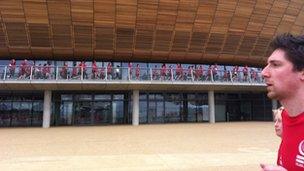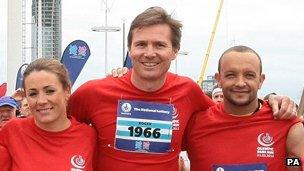London 2012: History and expectation at the Olympic Park
- Published
For a few seconds I was nipping at the heels of Roger Black as he ran across the London 2012 Olympic Park.
The Atlanta 1996 double silver medallist and his fellow athlete, javelin thrower Steve Backley, were in my wave of the Olympic Park Run - a five-mile race which saw 5,000 members of the public become the first people to cross the finish line in the Olympic Stadium.
I considered trying to keep up with him - it's not every day you have the chance to be paced by an Olympian - but I decided to spare his blushes, especially as it was his 46th birthday.
Before the start, Black had exhorted the excited runners - among them marathoning royal, Princess Beatrice - to "enjoy it, put a bit of fire in your belly but savour every step of your 300m in the Olympic Stadium because it's very special".
How right he was, but first there was the small matter of five miles to tackle, in a snaking route past the Olympic venues.
Velodrome and Copper Box
Runners, all in matching red T-shirts but some with a variety of patriotic accessories - kilts, Welsh dragon shorts, red, white and blue bubble wigs - whooped as we set off from the start line.

The route saw runners get up close and personal with the Velodrome
Crossing the River Lea we got first sight of the basketball arena and the graceful arc of the Velodrome.
The course took us under the eaves of that venue, with participants reflected like a scarlet ribbon in its smoked glass windows.
Next, a glimpse of blue through some yet-to-be-completed stands revealed we were passing the Riverside Arena hockey venue - where the Duchess of Cambridge recently showed her Marlborough School-honed skills.
Nearby, the monolithic Copper Box (the venue previously known as the handball arena) was dulled by today's chilly grey skies and this area of the Park, with the giant form of the Energy Centre, looked particularly in keeping with the location's industrial past.
Finishing touches
With the Games barely four months away, it's evident there's still plenty to be done to finish and prettify the public areas of the Park.
Although London 2012 officials, backed by IOC inspectors, say all venues are on schedule to be completed, the landscaping, signs and other finishing touches were still noticeably absent today.
Hard-hatted construction workers paused to cheer us on as we passed the water polo arena, Aquatics Centre and bordered the railway.
Up a fairly steep hill and around a corner and suddenly there it was, the building we'd been looking at all day, the Olympic Stadium.
But now instead of heading to the crowd entrance level, we were descending to the athletes' tunnel .
Inside the lower level, the acoustics became deadened and the dim lighting gave everything an odd look.
Then from speakers came the faint but so familiar strains of Vangelis's theme for Chariots of Fire - an emotive dog whistle for any British Olympic fan.
"This is where we run in slow motion," someone shouted.
Wide eyes and wider smiles all around suggested that we were all getting goosebumps.
"It brought a lump to my throat," runner Sarah Langborne would later tell me.
Mine too, for by some strange conjuring trick, the event, staged by London 2012 sponsors the National Lottery, managed to evoke a sense of history and expectation for the Games all in one go.
From the gloom of the tunnel, we popped out into the light and noise of the stadium, populated by a crowd of some 12,000 spectators, all family and friends of participants.

Roger Black, with presenter Nathalie Pinkham and athlete Jamie Baulch before the start of the race
"You're being a tourist," joshed a marshal as I stopped to take a picture.
But this was the bit that none of we mere mortals normally get the chance to do - to set foot on an Olympic track and dash down the finishing straight.
Some pulled a Usain Bolt pose, many took out phones to take pictures. We all waved to the crowd.
It felt surreal and amazing to sprint the final 100m, seeing the same view as Olympic and Paralympic athletes will have this summer.
Our names may not go down in sporting history for this run - except for the winner Tommy Davis, who beat the 1908 Olympic five-mile record by 0.2 of a second.
But the day as a whole gave a glimpse of how vibrant London 2012 may feel when people manage to take up their long-awaited seats in the venues.
Oh and Roger, I let you beat me. Happy birthday.
- Published1 April 2012
- Published31 March 2012
- Published12 March 2012
- Published30 September 2011